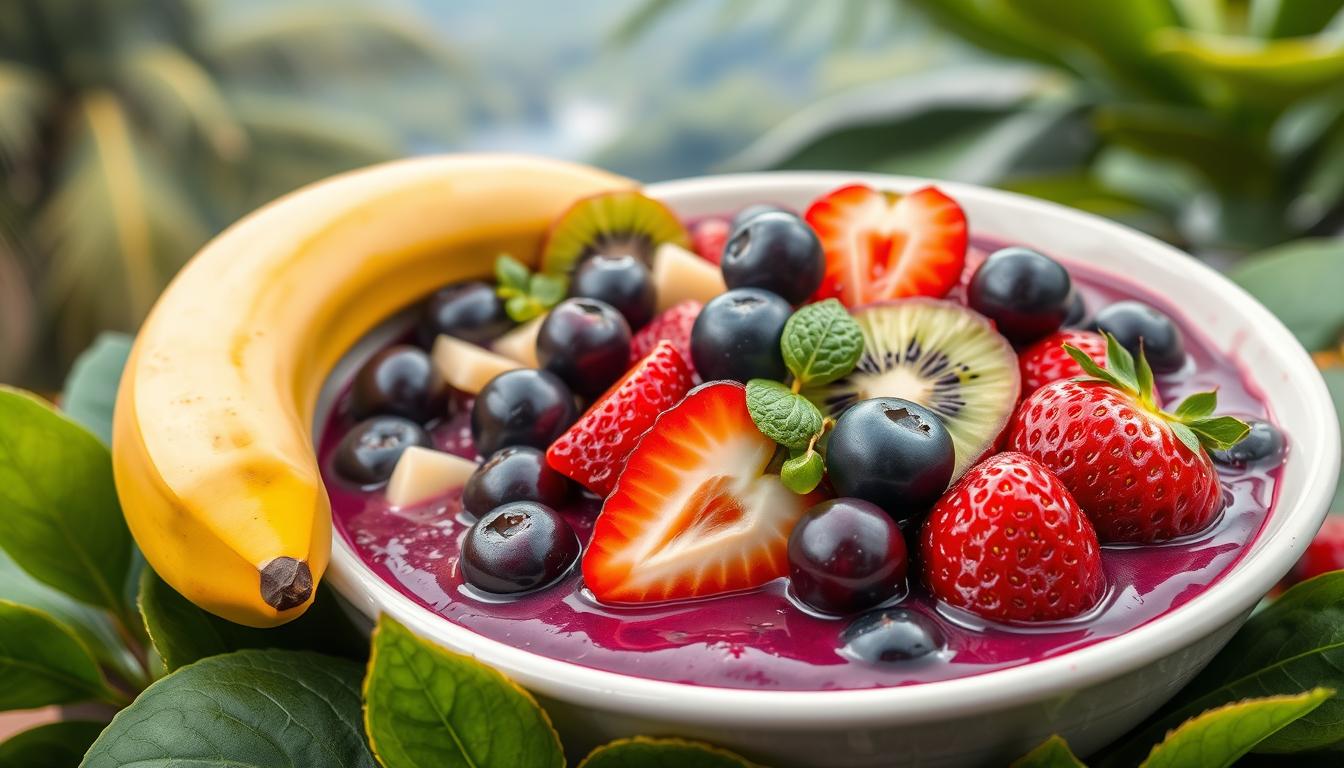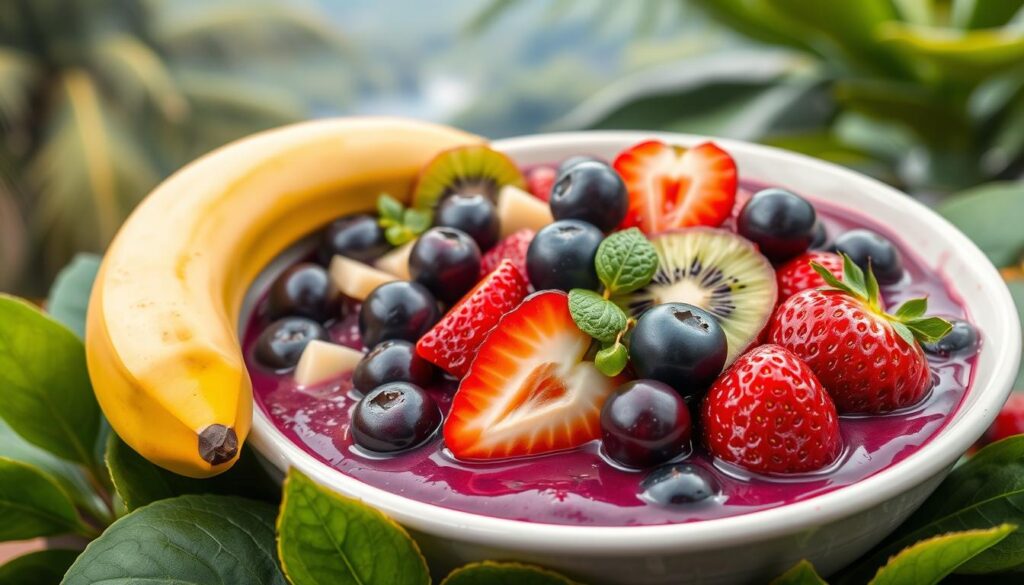Does acai have caffeine? The short answer is no, acai berries do not contain caffeine.
Acai berries have gained popularity due to their health benefits and vibrant taste. Originating from the Amazon rainforest, these small, dark purple fruits are known for their rich antioxidant content. Many people enjoy acai in smoothies, bowls, and supplements, seeking a natural energy boost.
But some wonder if this burst of energy comes from caffeine. It’s important to understand the nutritional profile of acai to appreciate its benefits fully. In this blog, we will explore what makes acai special and why it is a great addition to a healthy diet, minus the caffeine. Stay tuned to learn more about this superfood!
Introduction To Acai
Acai berries have gained popularity for their health benefits. Many people wonder about their properties. One common question is, “Does Acai have caffeine?” Before we answer that, let’s understand more about Acai.
What Is Acai?
Acai is a small, dark purple fruit. It comes from the Acai palm tree. These trees grow in the rainforests of South America. Acai berries are known for their rich flavor and nutritional value. They are often called a “superfood” because of their high antioxidant content.
Origins And History
The Acai palm tree is native to the Amazon rainforest. Indigenous tribes have used Acai berries for hundreds of years. They believed in the fruit’s healing properties. The berries were a staple in their diet. Early explorers to the Amazon discovered this fruit. Its popularity spread beyond the rainforest borders.
In the 1980s, Acai was introduced to the global market. Since then, it has become a popular ingredient in health foods and supplements. Today, people enjoy Acai in smoothies, bowls, and even as a frozen treat.
Acai berries themselves do not contain caffeine. They are naturally caffeine-free. This makes them a great choice for those avoiding caffeine.
Here is a table comparing Acai to other common fruits:
| Fruit | Contains Caffeine |
|---|---|
| Acai | No |
| Coffee Berry | Yes |
| Blueberry | No |
| Goji Berry | No |
Acai is a great addition to a healthy diet. It provides nutrients without caffeine. This can help people maintain a balanced energy level throughout the day.

Credit: co.pinterest.com
Nutritional Profile Of Acai
Acai berries are known for their rich nutritional profile. They are small, dark purple fruits that pack a powerful punch of nutrients. Let’s dive into the essential vitamins, minerals, and antioxidants present in acai berries.
Vitamins And Minerals
Acai berries are a good source of several important vitamins and minerals. Here’s a list of some key nutrients:
- Vitamin A: Supports vision and immune function.
- Vitamin C: Boosts the immune system and promotes healthy skin.
- Calcium: Essential for strong bones and teeth.
- Iron: Helps in the production of red blood cells.
These vitamins and minerals contribute to overall health and well-being. They play vital roles in various bodily functions.
Antioxidants And Benefits
Acai berries are rich in antioxidants, which protect the body from harmful free radicals. These antioxidants can help reduce oxidative stress and inflammation.
Some of the key antioxidants found in acai berries include:
- Anthocyanins: These give acai berries their deep purple color. They help in fighting inflammation.
- Polyphenols: These compounds support heart health and may reduce the risk of chronic diseases.
- Flavonoids: They have anti-inflammatory and immune-boosting properties.
Consuming acai berries can offer several health benefits, such as:
- Improved heart health
- Enhanced brain function
- Better digestion
- Increased energy levels
In conclusion, acai berries are a nutrient-dense fruit with multiple health benefits. Including them in your diet can support overall health.
Caffeine In Acai
Many people wonder if acai berries contain caffeine. It’s a common question. Acai berries are known for their health benefits. They are rich in antioxidants and vitamins. But what about caffeine content? Let’s explore some common misconceptions and scientific findings.
Common Misconceptions
Many believe acai berries have caffeine. This is not true. The confusion arises from their energy-boosting effects. People think these effects come from caffeine. But acai berries get their energy from other nutrients. They have no natural caffeine.
Scientific Findings
Research confirms acai berries do not contain caffeine. Studies show they are free from caffeine. They boost energy through antioxidants and healthy fats. These compounds improve overall health. They are good for heart and brain function. This is why acai is popular in healthy diets.

Credit: www.tropicalacai.com
Effects Of Caffeine On Health
Caffeine is a common stimulant. Many people consume it daily through coffee, tea, and energy drinks. Its effects on health can be both positive and negative. Understanding these effects helps make informed choices about caffeine consumption.
Positive Effects
Caffeine can boost energy levels. It can also improve mental alertness. People often use it to enhance focus and concentration. Athletes may find caffeine useful for improving physical performance. Some studies suggest it might help with weight loss by increasing metabolism.
Potential Risks
Excessive caffeine intake can lead to health problems. It can cause insomnia and restlessness. High doses may result in anxiety and jitteriness. Some people experience digestive issues. Others might have increased heart rate and blood pressure. Long-term overuse can lead to dependency and withdrawal symptoms.
Comparing Acai With Other Berries
Acai berries have gained popularity for their health benefits. But how do they compare to other berries? Let’s dive into the nutritional content and caffeine levels to understand better.
Nutritional Comparisons
Acai berries are often compared to other berries like blueberries, strawberries, and raspberries. Below is a table summarizing their nutritional values per 100 grams:
| Berry | Calories | Carbohydrates (g) | Fiber (g) | Sugar (g) | Protein (g) |
|---|---|---|---|---|---|
| Acai | 70 | 4 | 2 | 2 | 1 |
| Blueberries | 57 | 14 | 2.4 | 10 | 0.7 |
| Strawberries | 32 | 7.7 | 2 | 4.9 | 0.7 |
| Raspberries | 52 | 12 | 6.5 | 4.4 | 1.2 |
Acai berries have fewer calories and lower sugar content. Their fiber content is similar to strawberries and raspberries. Acai also contains more protein than blueberries and strawberries.
Caffeine Content
Many wonder about the caffeine content in acai berries. The good news is acai berries are caffeine-free. This makes them an excellent choice for those avoiding caffeine.
In contrast, let’s look at some common berries and their caffeine content:
- Blueberries: 0 mg
- Strawberries: 0 mg
- Raspberries: 0 mg
As you can see, most berries are also caffeine-free. This means you can enjoy acai berries without worrying about caffeine intake.

Credit: www.tropicalacai.com
Acai In Popular Products
Acai, a popular superfood, is often found in various health products. These berries are naturally caffeine-free, making them a great choice for those avoiding caffeine.
Acai berries have become a trendy superfood. They are packed with antioxidants and nutrients. Many people wonder if acai has caffeine. Let’s explore where acai appears in popular products.Acai Bowls And Smoothies
Acai bowls and smoothies are very popular. They are made using acai berry puree. These bowls often include other fruits and toppings. People love them for breakfast or a healthy snack. They are tasty and nutritious. Acai itself does not contain caffeine. So, acai bowls and smoothies are caffeine-free. This makes them a great option for any time of day. Enjoy without worrying about caffeine.Acai Supplements
Acai supplements come in many forms. You can find them as capsules, powders, or liquids. These supplements claim to offer various health benefits. They are convenient for those who do not eat acai regularly. Most acai supplements are made from pure acai. They do not have added caffeine. But, always check the label to be sure. Some supplements may contain other ingredients. Look for pure acai for a caffeine-free option. Acai in popular products is versatile and healthy. Whether in bowls, smoothies, or supplements, acai offers many benefits without caffeine. “`Health Benefits Of Acai
Acai berries are small, dark purple fruits that grow on acai palm trees. They are known for their rich antioxidant content and numerous health benefits. Consuming acai can provide many positive effects on your overall health.
Boosting Immunity
Acai berries are packed with vitamins and minerals. These nutrients help strengthen the immune system. The antioxidants in acai fight free radicals in the body. This reduces oxidative stress and prevents cell damage. A strong immune system helps ward off illnesses and infections.
Improving Digestion
Acai berries contain dietary fiber, which aids digestion. Fiber helps maintain regular bowel movements. It also prevents constipation and promotes gut health. The antioxidants in acai support a healthy digestive tract. They reduce inflammation and support the growth of good bacteria.
Frequently Asked Questions
Does Acai Contain Caffeine?
No, acai berries do not contain caffeine. They are naturally caffeine-free.
Is Acai A Good Energy Booster?
Yes, acai is a good energy booster. It contains antioxidants and healthy fats.
Can Acai Improve Focus And Alertness?
Yes, acai can improve focus and alertness. The antioxidants in acai can help enhance brain function.
Are There Any Side Effects Of Acai?
Acai is generally safe. However, excessive consumption might lead to digestive issues.
Conclusion
Acai berries don’t contain caffeine. They offer other health benefits instead. Full of antioxidants, acai boosts your immune system. Its natural energy may help you feel more awake. No caffeine jitters to worry about. This superfruit is ideal for a healthy diet.
Enjoy acai in bowls, smoothies, or snacks. It’s a tasty way to support your well-being. Now you know, acai is caffeine-free and nutritious. Consider adding it to your daily routine. Healthy choices lead to a better life.
